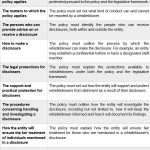3 September 2019
Contributors
Companies limited by guarantee must now ensure they have a compliant whistleblower policy or face potential penalties of up to $12,600, loss of tax concessions and de-registration
Key Information
– Charities and not-for-profits incorporated as companies limited by guarantee are required to implement a whistleblower policy by 1 January 2020;
– The penalties for failure to have a compliant whistleblower policy by the above date may include penalties of up to $12,600, deregistration of charity status and loss of tax concessions; and
– Neumann and Turnour Lawyers can help charities and not-for-profits create a compliant whistleblower policy. If you require assistance in creating or amending your whistleblower policy, we invite you to contact Dr Matthew Turnour, Chris Mills or Brayden Hargrave of our office here.
Introduction
Despite continued promises of a reduction in red tape for the charity sector, not-for-profits and charities that operate as companies limited by guarantee will now be required to implement a whistleblower policy and make it available to officers and employees of the company. While the charities sector is generally welcoming of additional protections for whistleblowers, the further regulation and red tape for companies operating in the sector is a burden.
The implementation of the whistleblower policy is, nevertheless, critically important for charities and not-for-profits as the penalties for failing to have a compliant whistleblower policy can be severe and may include penalties of up to $12,600, deregistration of charity status and loss of tax concessions. The need for a whistleblower policy cannot, therefore, be ignored.
The whistleblower policy must be in place by 1 January 2020. To assist our clients in the charities and not-for-profits sector, in this update, we explain the requirements for the whistleblower policy and the penalties for failing to have a compliant policy.
The requirements of the Whistleblower Policy
The statutory amendments require charities and not-for-profits to include specific items of information in their whistleblower policies. To summarise the requirements of the amendments, the policy must include at least the following:

The Australian Securities and Investment Commission (‘ASIC’) has released a draft regulatory guide concerning whistleblower policies. ASIC has explained further requirements needed for a whistleblower policy to meet best practice. These include, but are not limited to, how the whistleblower policy will be reviewed, the purpose of the policy and the roles and responsibilities of the people within the entity in relation to the policy.
As can be seen, the requirements for a compliant whistleblower policy are extensive, therefore, legal advice is often necessary to ensure an entity’s whistleblower policy is compliant with law.
Penalties for failing to have a compliant Whistleblower Policy
The penalties can be severe for charities and not-for-profits who fail to have compliant whistleblower policies by 1 January 2020.
The failure to have a compliant whistleblower policy will be an offence punishable by a maximum penalty of 60 penalty units, which is presently an amount of $12,600. The more severe consequence for charities, however, is that a failure to have a whistleblower policy carries a penalty of up to 60 penalty units. The breach of an act carrying 60 penalty units or more amounts to a breach of the ACNC governance standards, which is grounds for deregistration of charity status and loss of tax concessions.
The need for a whistleblower policy can, therefore, not be ignored. It is important that charities and not-for-profits move quickly to ensure they have compliant whistleblower policies.
If you require assistance in creating or amending your whistleblower policy, we invite you to contact Dr Matthew Turnour, Chris Mills or Brayden Hargrave of our office here.
DISCLAIMER: This update contains general information only. The information is not all inclusive and should not be considered to be legal advice. You should always obtain legal advice for your specific circumstances before relying on general information. This information was accurate at the date of publication, that being 3 September 2019.
With Compliments,
The Team at Neumann & Turnour Lawyers


